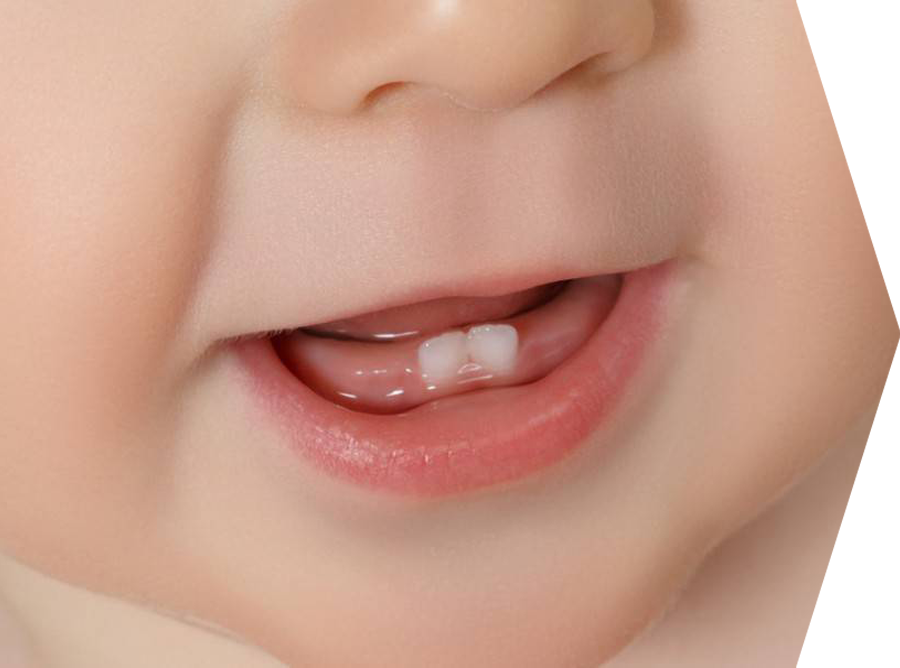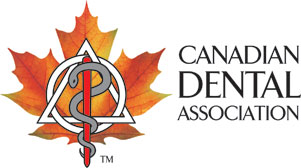First Tooth First Visit
Early childhood caries remains a significant problem, as evidenced by numbers of children treated in hospitals for severe caries. Early childhood caries also has the potential to adversely affect the general health of young children.
The dentist, through a comprehensive review of an infant’s medical history, oral evaluation, and environmental context, can identify patients at special risk for compromised oral health. Risk factors such as medical and social history, feeding patterns, presence of enamel anomalies, oral hygiene practice and fluoride availability can be identified by the age of one year. The Canadian Dental Association encourages the assessment of infants, by the dentist, to determine special risk, appropriate interventions and/or periodicity of future dental assessments, within 6 months of the eruption of the first tooth or by one year of age. Special risk patients may require frequent assessments in order to determine appropriate management strategies.
The Canadian Dental Association supports educational and cooperative initiatives with other health care providers and caregivers to expedite the development of partnerships in related pre-natal and post-natal preventive and educational programs.
The Canadian Dental Association supports educational and cooperative initiatives with other health care providers and caregivers to expedite the development of partnerships in related pre-natal and post-natal preventive and educational programs.
Oral Health Begins Before Birth
Making infant and children’s oral health a priority is a key to lifelong health. Children should see a dentist as soon as the first tooth erupts or by 12 months of age and regularly thereafter, just like regular check-ups with their paediatrician or family doctor. Tooth decay can start as soon as baby teeth erupt into the mouth. That is why it is important for parents to adopt healthy dental practices early.
Your dentist can provide you with ways to help prevent your child from developing tooth decay. They can give you tips on how to clean your child’s teeth, when to begin to use fluoridated toothpaste, and discuss good eating habits. One of the best ways to keep your child’s smile healthy for life is to start good oral health habits early, even before the teeth arrive.
The Canadian Dental Association (CDA) recommends a first dental visit within the first year (12 months) as a dental best practice to help prevent cavities. It helps to establish a dental home for the child and encourages the development of a positive relationship with your dentist.
Delaying that first visit can have serious consequences. A Canadian Institute for Health Information report showed that treating early childhood caries (severe decay in the teeth of infants or young children under six years of age) accounts for approximately one-third of all hospital day surgeries performed on pre-schoolers (ages 1-4 years old).
Toothaches and infections resulting from untreated cavities in primary (baby) teeth can affect a child’s health and well-being, sometimes resulting in lost sleep, poor growth and nutrition and behavioural problems. The negative impacts can also extend to a child’s self-esteem and their ability to learn, communicate and socialize.
Celebrate Your Child’s First Tooth
Your child’s first visit to the dentist is an important milestone and should be celebrated!
It is an opportunity for the dentist to establish a relationship with your child and provide guidance to parents on optimal oral care. Establishing a dental home at a young age will allow a long-lasting relationship, continuity of care and a reliable place to go in case of an emergency. Teaching parents and caregivers proper oral care from the start puts young children on the path to a healthy mouth and a healthy life.
How to Prevent Early Childhood Tooth Decay

Things you can do at home for your child to help prevent early childhood tooth decay:
How Dentists can Help Reduce Early Childhood Caries
The Canadian Dental Association (CDA) recommends a child’s first visit take place within 6 months of the first tooth erupting and no later than 12 months of age as a dental best practice to help prevent early childhood caries (ECC).
The Consequences of Early Childhood Caries
The consequences of untreated early childhood caries can be significant. Pain, difficulty eating and sleeping, speech difficulties and poor self-esteem may occur. Untreated ECC can affect growth and the ability to learn, communicate and socialize. Canadian evidence also suggests that children with severe early childhood caries are more likely to be anemic, iron deficient, and vitamin D deficient. According to a report from the Canadian Institute for Health Information (CIHI), hospital outpatient dental surgery for early childhood caries constituted 31% of all-day surgery for children age 1 to 4, making it the leading cause of day surgery for children in this age group. The quality of life of our youngest and often most vulnerable members of society can be seriously compromised and yet ECC is totally preventable.
Fluoride
Community water fluoridation is an important investment for all age groups, particularly children. Scientific evidence continues to support the health promoting effects of fluoridating drinking water which is a cost-effective population-health method of preventing tooth decay.
CDA uses a risk-based approach to determine whether fluoridated toothpaste should be used for children younger than 36 months of age. For children younger than 36 months who are at increased risk for ECC, it is recommended that parents use a grain of rice sized amount of fluoridated toothpaste to brush their child’s teeth. For children not at risk for ECC, parents can simply moisten the toothbrush bristles with water and then brush their child’s teeth. The CDA considers that any one or more of the following conditions place a child at risk for ECC:
- living in a community with non-fluoridated water supply or low natural fluoride levels (< 0.3 ppm);
- enamel defects, early signs of tooth decay (i.e. white chalky spots), or cavities;
- frequent intake of sugary snacks/drinks between meals (including bottle or sippy cup containing liquids other than water and sweetened medications);
- persons with special health care needs that limit cooperation with brushing and oral hygiene;
- teeth are not brushed at least twice daily;
- premature birth and low birth weight children;
- parent or primary caregiver has tooth decay;
- visible plaque on teeth.
Considering that ECC is a multifactorial disease, there are numerous other risk factors not appearing above that would justify recommendations to use a grain of rice sized amount of fluoridated toothpaste with infants and toddlers.
Health Risks of Poor Oral Health for Young Children
According to a report from the Canadian Institute for Health Information (CIHI), hospital outpatient dental surgery for early childhood caries constituted 31% of all day surgery for children age 1 to 4, making it the leading cause of day surgery for children in this age group.
The consequences of untreated early childhood caries can be significant. Pain, difficulty eating and sleeping, speech difficulties and poor self-esteem may occur. Untreated ECC can affect growth and the ability to learn, communicate and socialize. Canadian evidence also suggests that children with severe early childhood caries are more likely to be anemic, iron deficient, and vitamin D deficient.
The quality of life of our youngest and often most vulnerable members of our society can be seriously compromised and yet early childhood caries is totally preventable.
Visiting the dentist within the first 12 months or within 6 months of the first tooth erupting is a dental best practice to help reduce the incidence of early childhood caries.
While tooth decay is preventable, good oral health begins at birth and has a proven effect on overall health.
Watch our Video Spot
First Tooth – First Visit Content is provided courtesy of the Canadian Dental Association



